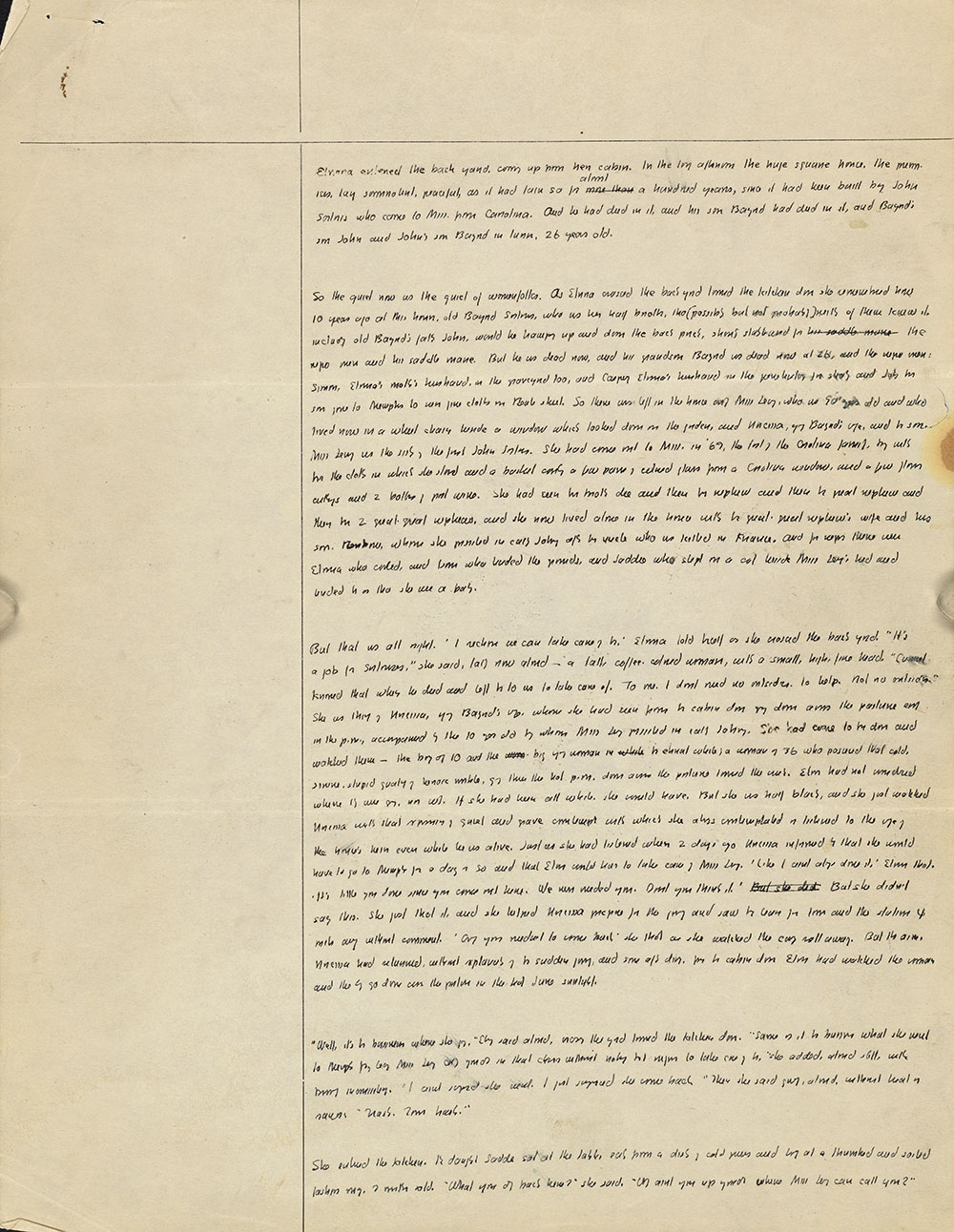TRANSCRIPTION
Elnora entered the back yard, coming up from her cabin. In the long afternoon the huge square house, the premi-
ses, lay somnolent, peaceful, as it had lain so for <more than> almost a hundred years, since it had been built by John
Sartoris who came to Miss. from Carolina. And he had died in it, and his son Bayard had died in it, and Bayard's
son John and John's son Bayard in turn, 26 years old.
So the quiet now was the quiet of womenfolks. As Elnora crossed the back yard toward the kitchen door she remembered how
10 years ago at this hour, old Bayard Sartoris, who was her half brother, tho (possibly but not probably) neither of them knew it,
including old Bayard's father John, would be tramping up and down the back porch, shouting stableward for <his saddle horse> the
negro men and his saddle mare. But he was dead now, and his grandson Bayard was dead now at 26, and the negro men:
Simon, Elnora's mother's husband, in the graveyard too, and Caspey Elnora's husband in the penitentiary too for stealing and [Job?] his
son gone to Memphis to wear fine clothes on Beale street. So there was left in the house only Miss Jenny, who was 90 years old and who
lived in a wheel chair beside a window which looked down on the garden, and Narcissa, young Bayard's wife, and her son.
Miss Jenny was the sister of the first John Sartoris. She had come out to Miss. in '69, the last of the Carolina family, bringing with
her the clothes in which she stood and a basket [carrying?] a few panes of colored glass window, and a few flower
cuttings and 2 bottles of port wine. She had seen her brother die and then her nephew and then her great nephew and
then her 2 great-great nephews, and she now lived alone in the house with her great-great nephew's wife and his
son, Benbow, whom she persisted in calling Johnny after his uncle who was killed in France. And for negroes there were
Elnora who cooked, and Isom who tended the grounds, and Saddie who slept on a cot beside Miss Jenny's bed and
tended her as tho she were a baby.
But that was all right. 'I reckon we can take care of her.' Elnora told herself as she crossed the back yard. "It's
a job for Sartorises," she said, talking now aloud – a tall, coffee-colored woman, with a small, high, fine head. "Cunnel
knowed that when he died and left it to us to take care of. To me, I dont need no outsiders to help. Not no outsiders."
She was thinking of Narcissa, young Bayard's wife, whom she had seen from the cabin door going down across the pasture [early?]
in the p.m., accompanied by the 10 year old boy whom Miss Jenny persisted in calling Johnny. She had come to the door and
watched them – the boy of 10 and the <wom> big young woman in <white> [illegible] eternal white; a woman of 36 who possessed that cold
[illegible], stupid quality of [illegible] marble, going thru the hot p.m. down across the pasture toward the creek. Elnora had not wondered
where they were going, nor why. If she had been all white, she would have. But she was half black, and she just watched
with that expression of quiet and grave contempt with which she always contemplated or listened to the wife of
the house's heir even while he was alive. Just as she had listened when 2 days ago Narcissa informed her that she would
have to go to Memphis for a day or so and that Elnora would have to take care of Miss Jenny. 'Like I aint always done it,' Elnora thought.
'It's little you done since you come out here. We never needed you. Dont you think it.' <But she did> But she didn't
say this. She just thought it, and she helped Narcissa prepare for the journey and saw her leave for town and the station 4
miles away without comment. 'And you needn't to come back,' she thought as she watched the car roll away. But this a.m.
Narcissa had returned, without [explanation?] of her sudden going, and [soon?] after dining, by her cabin door Elnora had watched the woman
and the boy go down across the pasture in the hot June sunlight.
"Well, it's her business where she goes," Elnora said aloud, crossing the yard toward the kitchen door. "Same as it her business what she went
to Memphis [illegible] leaving Miss Jenny setting yonder in that chair without nobody but niggers to take care of her," she added, aloud still, with
brooding inconsistency. 'I aint surprised she went. I just surprised she come back" Then she said [quietly?], aloud, without heat or
[rancor?] "Trash. Town trash."
She entered the kitchen. Her daughter Saddie sat at the table, eating from a dish of cold greens and looking at a thumbed and soiled
fashion mag. 3 months old. "What you doing back here?" she said. "Why aint you up yonder where Miss Jenny can call you?"
|


